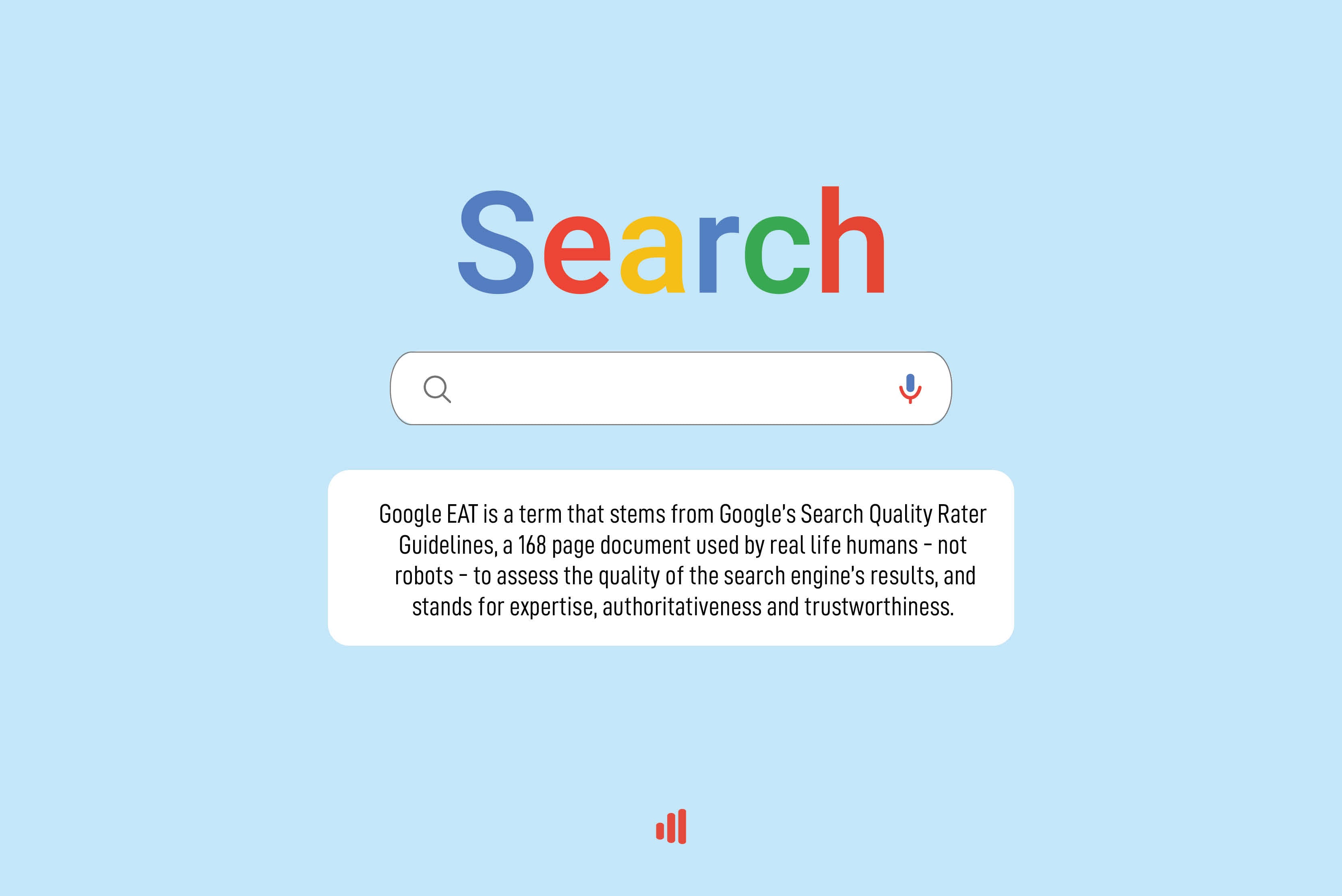The world of digital marketing is packed full of acronyms – but if you want to make your mark online, Google EAT is one that you should be paying attention to.
Despite popular opinion, Google EAT is not an algorithm that marketers must try to crack. Instead, think of the concept as a blueprint, or perhaps guidelines. However, like many other components that dictate how the world’s biggest search engine works, very little is known about the practice.

The Basics of Google EAT
In order to understand how Google EAT works, we’ll need to go back a few steps first and take a look at some of the other acronyms that internet savvy businesses need to address too.
Otherwise known as Search Engine Optimisation, SEO is what we call the practice of including specific content on your website that has the potential to improve your visibility on search engines, and in turn their users. Put simply, it helps your site show up more often in relevant searches, and is crucial if you want to reach the lofty heights of Google’s top rankings.
In comparison, PPC is Pay Per Click style marketing, where users pay every time an audience member clicks a link that directs them to the user’s website or social media platform. It’s a popular form of paid advertising that gives you the opportunity to be noticed by a wider audience online, while still being able to target specific demographics. While often regarded as a shortcut to getting your website in front of the right audiences, this practice can quickly add up and eat into your marketing budget – which is why brands need to have their own organic content as a means to balance this out.
However, even if you are regularly blogging, properly optimising your content and targeting all the right keywords, this still might not be enough, which is where the “rank factor” your website is given from the Google EAT fundamentals comes into play.
Google EAT is a term that stems from Google’s Search Quality Rater Guidelines, a 168 page document used by real life humans – not robots – to assess the quality of the search engine’s results, and stands for expertise, authoritativeness and trustworthiness. In the document, the three key factors are defined as the following.
Expertise – This element focuses on the context of the content providing an expert outlook, with the purpose of filtering out “click bait” or web pages that are shallow in essence. It looks at the expertise of the page of contents, not the website’s content as a whole. Though Google is unclear of the criteria, having an expert author or expert opinions within your published content will likely help you score high in expertise, and deem you to be an expert in your field.
Authoritativeness – This element focuses on the authority of the website’s content and the strength of the domain. These rankings arrive from external signals, such as high quality backlinks from other relevant websites, brand mentions across forums, and social media channels or platforms. Each backlink represents another brand, business, website or user “vouching” for you as an authority within your field or sector.
Trustworthiness – While similar to expertise, the pillar of trustworthiness instead focuses on the reliability of the content in relation to the overall trustworthiness of the domain in question. For example, in the event that you had less than desirable content across your sales consulting website, but then landed a guest post by Jordan Belfort, author of “Wolf of Wall Street”, the article would appeal to the expertise element of Google Eat, but not overall trustworthiness.

If you’re doing business online and reading this article, then it’s safe to say that you already know the importance of blogging for business. Thankfully, the bigwigs over at Google have given digital marketers a few hints and cheat codes when it comes to meeting the standards outlined by the Google EAT principles, to ensure that your content is landing in front of the right audiences.
When writing your next blog or article to post to your business or brand’s website, be sure to use the following questions as a checklist to ensure that your content meets the fundamentals of Google EAT, as outlined in the Quality Rater Guidelines (or Google’s Bible).
- Does the content contain original information, reporting, research or analysis?
- If content pulls from other sources, does it provide substantial added value and originality rather than simply copying or rewriting from sources?
- Does the title or headline of the page steer away from exaggeration or shock in nature?
- Is this content written by an expert or enthusiast who demonstrably knows the topic well?
- Is the content free from easily verified factual errors?
- Was the content produced well, or does it appear sloppy or hastily produced?
- Does content display well for mobile devices when viewed on them?
- Does the content provide substantial value when compared to other pages in search results?
Sourcing Help With Blogging For SEO And Google EAT
Producing quality, consistent and on brand content takes time, effort, experience and resources – and you’re not alone if you can’t quite commit to that. Avoiding blogging for business altogether may actually be doing your brand a disservice, but thankfully – investing in a solid content marketing strategy has never been easier.
Here at Content Hive, producing top quality digital content is exactly what we do best. We have itemised a list of digital content services, and allocated credits next to each of these. This means that each month, you can use your credits with us to produce digital content such as blog articles, social media posts, videos and even animated Instagram stories. By using this model, we believe that it enables us to produce high quality content with faster delivery times. It also means that because you have a monthly credit, you are going to want to make sure you use these up – and so do we – meaning that your digital content is always consistent.
If you aren’t quite sure where to start on your digital marketing journey and would like to speak to a professional, why not book in a free discovery call with us at Content Hive today to discuss how we can get your brand buzzing online.


